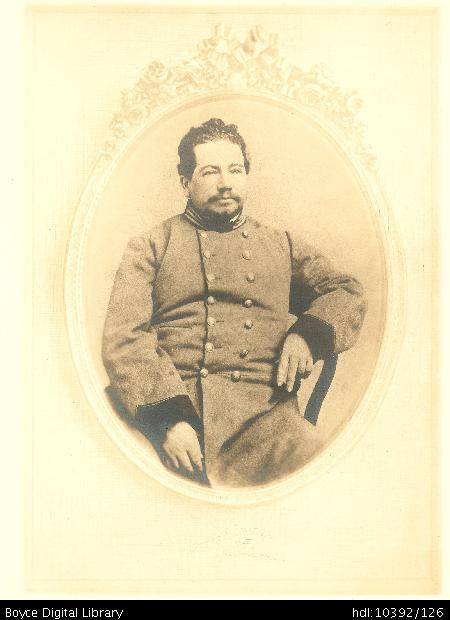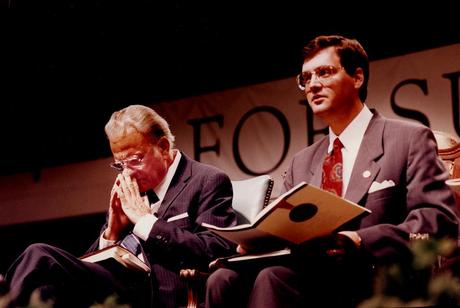
James Petigru Boyce in Confederate uniform
By Alan Bean
It is hard to believe that two full decades have passed since R. Albert Mohler ascended to the presidency of the Southern Baptist Theological Seminary in Louisville, Kentucky. To celebrate this momentous occasion, the seminary has produced a twenty-five minute documentary documenting the heroic stand Dr. Mohler took against the progressives and liberals who controlled the seminary prior to his arrival.
Earlier this morning I posted a video by Chimamanda Adichie, a Nigerian storyteller. It’s a TED talk delivered in Oxford, England. Adichie says that when we limit ourselves to one story about a person or a people, no matter how well-researched and compelling, we are bound to get almost everything wrong. The truth emerges from many stories; one story, taken alone, will always be a lie.
Southern Seminary’s celebratory documentary is, without apology, a single story. It is not surprising that none of the “progressive” or “liberal” professors who once marred the heritage of James Petigru Boyce, the seminary’s founder, were asked to comment. The only representatives from this apostate assemblage are Dianna Garland and Molly Marshall, the only women who appear in the documentary. Dr. Mohler courageously forced these women to resign their teaching positions in the face of overwhelming outrage.
The documentary doesn’t obscure the fact that nobody supported the president’s draconian behavior. The student body and all but four professors were adamantly opposed. Virtually no one associated with the pedagogical process at the school agreed with Al Mohler and yet he stuck to his guns.
What is a seminary? The flesh and blood people who currently walk the halls, offices and classrooms, or the tiny band of slavery-endorsing Confederate Calvinists who founded the school in 1859? According to the documentary, the answer is neither. The seminary is defined by the Abstract of Principles penned by Basil Manly Jr. by combining a number of Baptist confessions into a single document. Professors Garland and Marshall signed the Abstract in good faith. They interpreted the document in one way; Dr. Mohler interpreted it very differently. Mohler’s interpretation prevailed because he had the support of the conservative movement and they didn’t. It was simple matter of power politics. Many stories were reduced to a single narrative by brute force and the seminary was saved.
The documentary doesn’t trouble itself with the fact that almost half of the folks voting at the the annual convention showdowns opposed the spirit of the conservative movement. It didn’t matter. A tiny majority supported the movement, and that was all that mattered.
I wonder if the folks who produced this bit of hagiography are troubled by the fact that every single person featured in the piece is a white male? I doubt it. They could have lined up a conservative female student who attended Southern in 1993 and supported Dr. Mohler’s ascendancy. There must have been at least one–Southern had 3,000 students at the time.
But that’s just the problem. Women aren’t supposed to attend seminaries designed prepare men for pastoral ministry. Any female student studying at Southern in 1993 must, in retrospect, be viewed as a child of darkness.
The producers could have interviewed a seminary secretary, I suppose, but who cares what secretaries think? The folks featured in the film are heavy hitters, men of substance, great minds.
If you asked Al Mohler, or any of the long list of while male worthies appearing in this documentary, why they don’t believe women should serve in positions of ministry or hold authority over men in any ecclesiastical capacity, they would tell you it doesn’t matter how they feel or what they think. They don’t personally have a problem with women; God has a problem with women. He says so in His inerrant word.
If you could travel back in time and ask James Petigru Boyce why he wore the uniform of an army dedicated to maintaining the institution of slavery and the principle of white supremacy, he would likely say much the same thing. It wasn’t a matter of whether the founders of Southern Seminary believed Negroes were inferior to Caucasians and thus fit only for the status of chattel property. The founders didn’t create black people as an inferior species; God did that. He said so in the same inerrant Word that, in the opinion of virtually every gentleman theologian working in the Southern states in the mid nineteenth century, celebrated slavery as the revealed will of God.
I have long argued that a preference for reading the Bible literally became popular in the South because it allowed theologians to trump the radically inclusive teaching of Jesus with select quotes from the Apostle Paul and the Old Testament. If you start with Jesus you will never end with slavery or the systematic exclusion of women. So you start with the handful of passages that appear to sanction your pet prejudices and then argue that, because the Bible speaks with a single voice, Jesus must have endorsed the virtue of slavery (in the nineteenth century) or the systematic humiliation of women (late twentieth century). What’s good enough for the father must be good enough for the son.

A young Al Mohler with Billy Graham
What happens when the Christian faith is reduced to a single story? In the mid-nineteenth century you get slavish support for the institution of slavery? In the early twenty-first century, you get an all-white, all-male institution preparing pastors for leadership in all-white, male-led congregations.
If the men and women who taught at Southern Seminary when I was student there were liberal in any sense, it was only because Jesus was telling them to grow beyond a rigid orthodoxy that relegated women to secondary status and a religious tradition that condemned the civil rights movement as thinly-disguised communism.
These folks loved the South, the Southern Baptist Convention, and the heritage of Southern Seminary; but their primary allegiance was to Jesus Christ.
I was surprised to discover that the documentary freely admits that Al Mohler had been dreaming of being president of Southern Seminary for at least a decade when, at the tender age of 33, his dream was suddenly realized. The story of Al calling up his pal, Danny Akin, at an ungodly hour to share the exciting news that the trustees had offered him the big job is more-than-just-a-little embarrassing. When young leaders are thrust into positions of great responsibility, aren’t they supposed to be humbled and awed by the enormity of the task them?
According to the documentary, Al Mohler was thrilled to death to have be chosen “for such a time as this” because God, long before the foundations of the earth were laid, had preordained that it should be thus. (Yes, it actually says that.) Who is Al Mohler to argue with a God who ordains slavery, relegates women to the kitchen, and chooses thirty-something neophytes to lead a time-honored institution?
That said, we can only marvel at the marvels Al Mohler has wrought. He has survived his critics. He has evolved into the intellectual voice of conservative evangelicalism. And it won’t be long before he will be celebrated as the elder statesman of the New Calvinism he now champions.
It’s always nice to see a boy chase his dreams and catch them . . . even if he has to ruin a few hundred careers to make it happen. Remember, it wasn’t Al’s idea.
